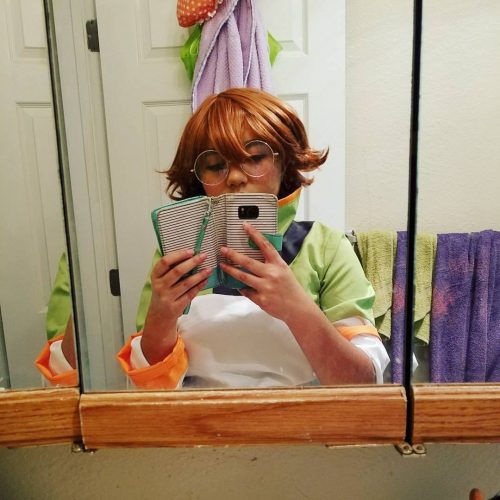
Pidge cosplay, Fall 2017, Halloween
i’ve been cosplaying for a while now. i think i started getting into the art form (yes, i call it an art form. it takes a lot more work than you would think!) around middle school. i had a friend who was really into anime and cosplay, and they wanted me to dress up with them. i’ve come a lot way since then, as you can see in the photo above. i can’t make a cosplay is my life depended on it, but i know how to do my makeup and style a wig and put in colored contacts, so that’s pretty cool! plus, cosplay is a nice way to use those talents and show my love for my shows and fandoms to the world, or just at little anime conventions like Sakura Con, our local anime convention in Seattle, or at really small ones like Chibi Chibi Con here at Evergreen, or Tamago Con which will be happening this December as SPSCC (and i might be tabling there, so please come check it out! buy my art!).
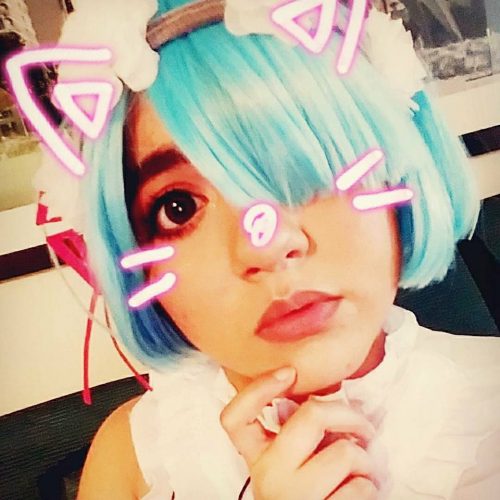
Rem cosplay, Spring 2017, Sakura Con (Seattle)
one thing that really bothers me about the cosplay community is the colorism and racism that runs rampant in our community. i’m hesitant to consider myself part of the anime and cosplay community because many folks who are a part of it are, to be frank, hot garbage people. weeaboos, “otaku,” and many cringy folks that remind me of myself back in middle school, but who are well-meaning people who are really just excited about their various hobbies, can be a hassle to deal with at times. many folks who see people dressed in cosplay with ask you for pictures, often with baited breath, waiting for you to say yes. i don’t get asked for pictures too often, but when i do i realize how much different i look from other cosplayers around us, mingling back and forth through the dealer’s hall, who are mainly white or east asian.
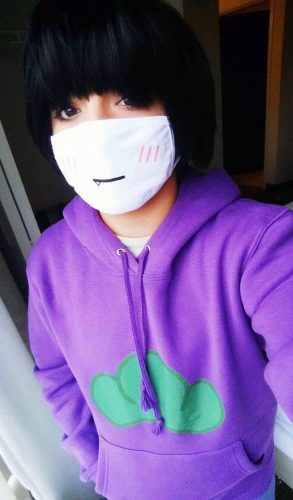
Ichimatsu cosplay, Spring 2016, Sakura Con (Seattle)
my nose is bigger than other asian people’s noses, my skin is more tan (but still light, i’m not at all a very dark skinned person), my eyes have double lids and are set deep into my skull, my eyes are dark brown. many features that i have are usually seen as socially unacceptable in the cosplay community, and even more so for folks who identify as BIPOC (black/indigenous/people of color) who want to participate in cosplay and meet new friends through the medium.
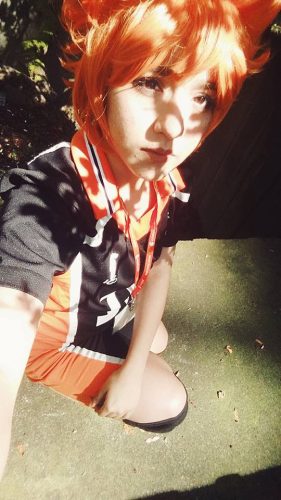
Hinata Shoyo cosplay, Spring 2016, Sakura Con (Seattle)
many black and brown cosplayers get attacked, both in person and online, for trying to dress up as their favorite characters, mostly because those folks have narrow-minded views on what their characters are supposed to look like, and mostly because they’re racist and hate seeing brown folks enjoy anything. i’ve seen many cosplayers get called racial slurs, get body-shamed for cosplaying people who are drawn as skinny, get told they’re too dark to cosplay this or that character, and other really vile things that should never been said to anyone. it makes me worried for my friends who would love to cosplay if it wasn’t for the danger they could face for even expressing interest in dressing up as their favorite character.
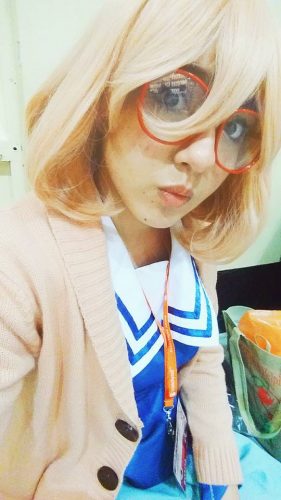
Mirai cosplay, Spring 2016, Sakura Con (Seattle)
but in reality, none of these characters are real. it shouldn’t be the norm that all of these characters that we know and love have to be white or east asian, and skinny and other ridiculous beauty standards that people keep saying that characters that we love are “supposed” to look like. fuck that! we can interpret them any way we want. you want to see a black hermione? go for it. a transgender james from team rocket? sure! please, i would love to see that. cosplay and anime and cartoons would be so much better if we had more leeway and time to experiment and branch out into new territories, and to see ourselves represented in the things we love! that’s why i continue to cosplay, and why other BIPOC continue to do the same. fuck all that racism and other oppressive shit. i’m just here to have a good time while i sweat under the heat of my wig and laugh at funny jokes with my other anime and cartoon nerds.
next cosplays to do:
- rock lee from naruto
- izuku midoriya from boku no hero academia
- ryuji sakamoto from persona 5
- noctis from final fantasy XV
- josuke higashikata from jojo’s bizarre adventure part 4
- tsuyu asui from boku no hero academia (but i’m scared about cosplayign girls because of harrassment!)
